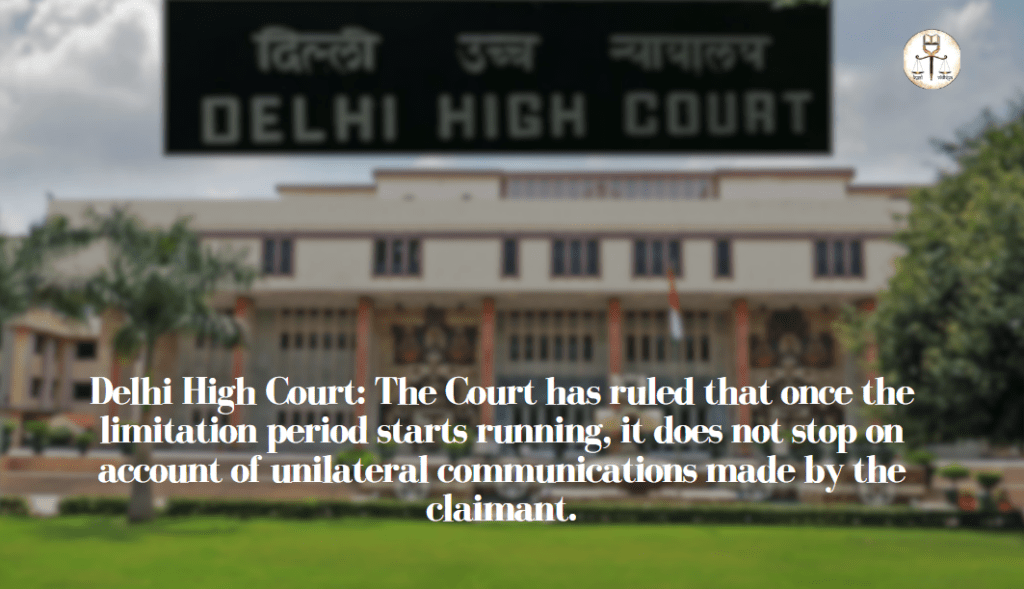
The Delhi High Court upheld the order of the learned Commercial Court in dismissing the appellant’s suit as barred by limitation law. In this matter, the appellant, M/s Nand Kishore Anil Kumar, has preferred this present appeal impugning an order dated 12.07.2022 which was passed by the learned Commercial Court, New Delhi, whereby the Court allowed the application of the respondents, The Registrar, University of Delhi, under Order VII Rule 11 of the Code of Civil Procedure, 1908, and as a consequence, the suit preferred by the appellant was dismissed.
It was claimed by the appellant that he was carrying on the business of construction and allied activities under the name of his sole proprietorship business named M/s Nand Kishore Anil Kumar. The respondent, i.e. Delhi University, had awarded a contract to the appellant for the construction of Vertical Extension of Two Stories of the Dr. B.R. Ambedkar Centre for Biomedical Research, in the North Campus of Delhi University, in consonance of a Letter of Award (LoA) dated 13th October, 2008. The work was stipulated to be completed within a period of fifteen months to be reckoned after ten days from the date of issuance of the LoA.
On completion of the works, the appellant was paid a certain sum against all the bills. The said amount was accepted by the appellant on the condition that the additional amount would be claimed later. The appellant later, through a letter dated 8th February, 2016 to respondent claimed for release of payment for reimbursement of labour and interest, and for reimbursement of testing charges. The respondent reimbursed testing charges of a specified amount, but did not release the balance payment as claimed by the appellant.
The appellant sought to refer the dispute for arbitration as per the arbitration agreement clause. The respondent disagreed with the appellant’s request for appointing an arbitrator. Subsequently, under section 11(6) of the Arbitration And Conciliation Act of 1996, the appellant prayed before the Hon’ble Delhi High Court for appointment of an arbitrator. The Hon’ble Delhi High Court disposed off the suit by entitling the petitioner to file a civil suit in a civil court on the disputed issues. Thereafter, the appellant filed the suit before learned Commercial Court, New Delhi, which in turn, dismissed the suit by accepting the respondent’s plea that the suit was barred by limitation. It was also observed that since there was an arbitration agreement between the parties, the appellant could not have invoked the jurisdiction of a civil court.
The main issue in this case was whether the suit preferred by the appellant was expressly barred by law of limitation and whether the suit could be rejected on ground of its non-maintainability for the parties had entered into an arbitration agreement.
In this case, a Division Bench of Justices Vibhu Bakhru And Amit Mahajan of the Hon’ble Delhi High Court dismissed the appeal and held that the cause of action of the appellant regarding increase in the charges of labour had arisen on or prior to the completion of the works or on expiration of six months from the submission of the final bill. Thus, any action on its part in seeking reimbursement of such amount would be expressly barred by limitation law, and any letter requesting for payment of labour charges by the appellant would not extend the period of limitation. The Hon’ble Court also held that once the limitation period starts to be calculated, it does not stop owing to any unilateral communications made by the claimant. Further, Hon’ble Court also agreed with the reasoning of the learned Commercial Court that on the subsistence of the arbitration agreement between the parties, the appellant could not have invoked the jurisdiction of a civil court.
CASE NAME: Shri Anil Khandelwal vs. The Registrar University Of Delhi (Decided on 5th January, 2024).
Aditya Paul, 5th Year Student, Adamas University, Intern Under Legal Vidhiya.
Disclaimer: The materials provided herein are intended solely for informational purposes. Accessing or using the site or the materials does not establish an attorney-client relationship. The information presented on this site is not to be construed as legal or professional advice, and it should not be relied upon for such purposes or used as a substitute for advice from a licensed attorney in your state. Additionally, the viewpoint presented by the author is of a personal nature.




0 Comments